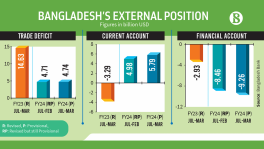Visually-impaired graduates depressed, starving: Speakers
The speakers urged the government to ensure the employment of people with visual impairments

Speakers at a programme said visually-impaired graduates are starving and living in depressed conditions in the absence of jobs.
If the situation continues, they will have no choice but to commit suicide due to the starvation, they said.
They make the remarks at a press conference arranged by the Job-seeking Visually-Impaired Graduate Council, a volunteer organisation, at Dhaka Reporters Unity in the city on Friday.
At the programme, visually impaired graduates urged the government to ensure their employment to save them from starving to death.
The leaders of the platform also urged for implementation of its 19-point demand, including a Tk10,000 monthly unemployment allowance and the establishment of a Disability Rights Department.
They also demanded that: 1,000 visually-impaired people be employed according to merit; they receive the Covid-19 vaccination on a priority basis; they be enrolled in educational institutions following a disability quota, and they have 5% of the employment in private institutions.
Chief guest Dr Mahbubur Rahman Litu, assistant proctor of Dhaka University and chairman of the Institute of Education and Research, said the prime minister had promised to solve visually impaired graduates' problems more than a year ago but this has not materialised yet.
Mohammad Ali Hossain, convener of the platform, said, "When the country is moving forward under leadership of the prime minister, some of my educated visually impaired children are struggling to survive in the absence of jobs."
UNICEF Representative Zahidur Kabir, Noakhali Science and Technology University Assistant Professor Fatema Poppy, Rajshahi University lecturer Kamrul Hasan, and others also spoke at the programme.
Visually-impaired graduates have been protesting for two years to press home their demands. The programmes have included human chains, sit-in demonstrations and hunger strikes.
They also submitted memoranda to the Disability Development Foundation, the Department of Social Services, the Public Service Commission, and the Ministry of Social Welfare and the Prime Minister's Office to realise their demands.


 Keep updated, follow The Business Standard's Google news channel
Keep updated, follow The Business Standard's Google news channel
















